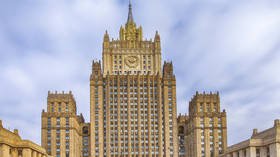Russian Foreign Ministry to develop AI system for analyzing policy data

The Russian Foreign Ministry is to work on a new big-data system that will use artificial intelligence to help the department conduct its “many analytical tasks” in relation to policy, it revealed on Tuesday.
Sergey Kiryushin, special representative for the digital transformation, told Moscow daily RBK that the ministry would be partnering with the Ivannikov Institute for System Programming to develop the concept next year.
“Based on the results of the conceptual design, we will determine the financing of the program, but for now, this issue is under discussion,” Kiryushin said.
The official declined to disclose what kind of data the machine would be used to analyze, simply noting that there are many various tasks in foreign policy that such artificial intelligence could help with.
This latest development is part of the Ministry of Foreign Affairs’ wide-ranging digital transformation program. From 2021-2023, the department plans to spend 2.3 billion rubles ($31 million) to improve its information systems and become independent of foreign software. In April, it was reported that AI would be used to support foreign economic activity.
Oleg Shakirov, a senior expert at the Center for Advanced Management Solution, told RBK that the foreign ministries of many other countries use AI in a range of different capacities.
“An example of a more advanced solution is the UK Department for International Development, which uses a model to estimate population distribution in developing countries based on the analysis of satellite images using machine vision,” he explained. “The media have also reported on the development of a prototype of artificial-intelligence-based solutions at the Chinese Foreign Ministry.”













